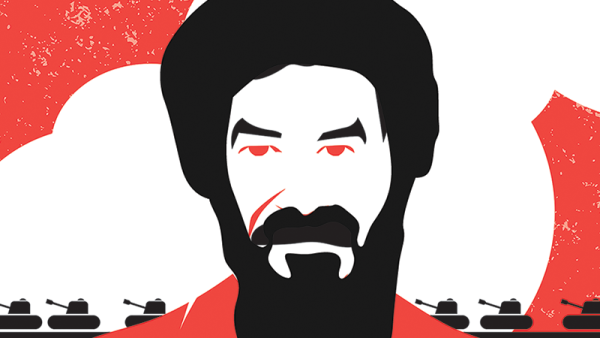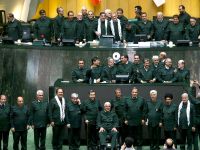Many years after their demise, several figures are gaining increasing attention in the online world, including the former Iraqi president Saddam Hussein who was overthrown by the US 2003 invasion and executed in 2007, in addition to the Saudi-born founder of the terrorist Al-Qaeda organization, Osama bin Laden, who was killed in a US 2011 airstrike in Pakistan.
We are deciding for ourselves - in very long lines and by mail.
— Al ????➊ Criswell (@Gdad1) October 16, 2020
You may not like the result.
Trump about the Bin Laden body double lie: “That was a retweet, I’ll put it out there. People can decide for themselves.” #TrumpTownHallDisasterpic.twitter.com/lsKopxVmpS
Even though it's normal to see online discussions over historical figures every now and then, it's fairly unusual for the internet world to be busy with multiple old names at a time they no longer pause a threat to the world, especially as the world already has too many issues to tackle at once since the beginning of 2020.
Recently, Bin Laden's name has made a strong media presence that coincided with the approaching US elections. Not only did media outlets interview and report political views of Bin Laden's family members, as in the New York Post and Fox News interviews with his niece, Noor, who voiced out her support for Donald Trump's re-election, his name was also mentioned during the town hall interview with Trump two weeks ago. In that interview, the president faced a question over tweeting conspiracy theory claims, which suggest that the former most wanted man in the world hasn't been killed in 2011, triggering a lot of controversies.
Don’t worry. You have the KKK and Bin Laden’s niece for support...although she DOES talk about how hard it is; you know, being your supporter. pic.twitter.com/g9LVSRkANY
— kay quinn (@AlephsMom) October 22, 2020
How would a dictator justify his brutality?
— Al Jazeera English (@AJEnglish) October 20, 2020
In the latest episode of our docudrama podcast #Hindsight, hear the story of former Iraqi president Saddam Hussein in his own words.
?Full episode: https://t.co/38WyiKD4Sa pic.twitter.com/c8JqKQQZU2
Additionally, Saddam Hussein's name has gone viral online following an episode of the Al Jazeera English podcast Hindsight shed light on the former Iraqi president's life, using the first-person narration.
Causing even stronger online controversy, was the Twitter appearance of Bin Laden's daughter, Saba, whose tweets triggered many conversations about 9/11 and the US wars started afterward.
Who needs family support; Trump has a “Bin Laden” by his side and she feels fully “American at Heart!”#USA #DonaldTrump https://t.co/ALySxTF56q
— Al Bawaba Node (@_thenode) September 6, 2020
What’s up with the Bin Laden’s? Are the offspring aspiring to be the new Kardashians?#TheNode https://t.co/nzEmEcqfoq
— Al Bawaba Node (@_thenode) October 18, 2020
The timing of how these online conversations have come together before US elections, could suggest that certain Western political agendas might be searching for "a foreign enemy figure" that everyone would want to stand against, which could unite political voices for one side or another; most especially to draw the attention of the growing right-wing sentiment in some Western countries.
This claim has been supported by the recent clash between the French President Emmanuel Macron and the Muslim community in France in light of his remarks against what he termed as "separatist Islam" vowing to step up against it.
Questions about how to fight radical Islam will feature heavily in the 2022 presidential election, in which Macron will likely face far-right leader Marine Le Pen.https://t.co/r3ATgs7jwb
— POLITICOEurope (@POLITICOEurope) October 21, 2020
'Far too many prominent European Union politicians, including those committed to liberal democratic values, no longer pause before pinning the blame for social problems on Muslim minorities.' @hahellyer https://t.co/64Avbyl7LS
— Lina (@Lina_Serene) October 21, 2020
Many analysts have linked Macron's remarks with his preparations for the French upcoming elections in less than two years, saying that he is trying to attract the votes of citizens leaning towards the right, who usually advocate strong anti-immigration policies and warn of "the danger caused" by Muslim immigrants who mostly hail from North Africa.
Without freedom of speech there wouldn't be an Islam in the first place. It is the first freedom upon which everything else is built upon. https://t.co/EzDjdu2sjX
— Zaid Jilani (@ZaidJilani) October 17, 2020
Only weeks after the tensions triggered by Macron's speech, a Muslim student who has been granted asylum beheaded a French teacher, who had shown controversial cartoons that had been deemed "offensive" by many Muslims to his class, sending shock waves across France.







